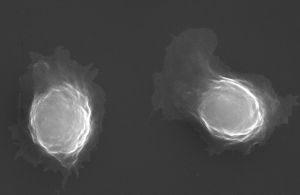B lymphocytes detect the presence of antigen (a foreign molecule for the organism that usually comes from pathogens as bacteria and virus) on an antigen presenting cell of the immune system. The interaction between both cell surfaces (immune synapse) allows that the B lymphocyte captures the antigen, internalizes it and processes it as an initial phase of the humoral immune response, that finally leads to the production of memory B cells and antibody-secreting cells.
Carrasco, corresponding author in this research, highlights “we have observed that DGK ζ is essential during immune synapse for the remodeling of the cell cytoskeleton using mouse models deficient in the protein”. “ The tight contact between both cells requires of dramatic changes in the mechanical properties of flexibility and elasticity of their surface and the presence of DGK ζ is fundamental for the actin cytoskeleton reorganization and for providing the needed flexibility to the B lymphocyte”.
The B lymphocytes of DGK ζ -deficient mice are not able to capture antigen with the same efficiency as the lymphocytes from wild type mice. Consequently, this affects their ability to respond against pathogens and to generate antibody-producing cells and memory cells for the long-term protection, both in charge of conferring immunity against a new exposition to that antigen. These results also suggest that DGK ζ has a similar role in other cell-to-cell interactions of the immune system. Thus, it is important to improve the knowledge on those events for the use of DGK as therapeutic targets.
More information
Science Signaling April 14, 2020
DOI: https://stke.sciencemag.org/content/13/627/eaaw8214
Diacylglycerol kinase ζ regulates actin cytoskeleton remodeling and mechanical forces at the B cell immune synapses. Sara V. Merino-Cortes, Sofía R. Gardeta, Sara Román-García, Ana Martínez-Riaño, Judith Pineau, Rosa Liebana, Isabel Mérida, Ana-María Lennon Dumenil, Paolo Pierobon, Julien Husson, Balbino Alarcón, and Yolanda R. Carrasco.






